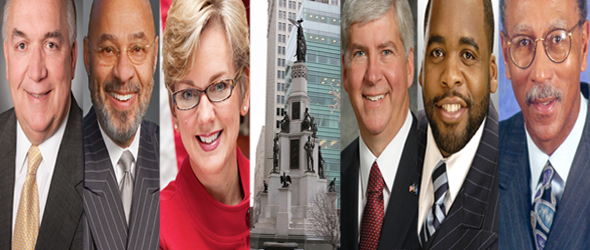Handshake deal with state haunts Detroit
It seemed a reasonable deal when Gov. John Engler and Detroit Mayor Dennis Archer shook hands on it in 1998.
The state of Michigan would give Detroit $333.9 million annually for nine years in revenue sharing funds -- if the city would ratchet down its highest-in-the-state city income tax rates.
All was going well, until the economy tanked, dragging the state’s tax collections and budget down with it. Detroit wound up getting far, far less than it was promised.
By one calculation, the city could have gained $700 million in additional funds in the period – for a city that has run repeated deficits (about $400 million this year alone) and piled up billions in debt to compensate.
And far more than money vanished – Detroit’s leaders and residents have never forgiven the state for how they were treated. And this ill will is affecting ongoing efforts to get Michigan’s largest city back on a financial even keel.
“The state of Michigan broke its promise to Detroit,” says Kenneth Cole*, the city’s longtime lobbyist.
Cole says Detroit lost $220 million worth of revenue sharing, plus $433 million to $508 million in income tax it wasn’t allowed to collect.
“No reasonable person can deny the impact this 1998 deal had on Detroit and its ability to deliver essential city services,” Cole added. “Why should Detroit again entrust its future to the state of Michigan?”
It’s a question many Detroiters are asking in the wake of Gov. Rick Snyder’s appointment of Kevyn Orr as emergency financial manager to take control of the city’s fiscal crisis.
This crisis, Cole and city leaders say, was made worse by the state when it reneged on the 1998 agreement.
Detroiters carp about the issue almost daily on radio talk shows.
Mayor David Bing brought it up in last month’s State of the City message.
And it was the centerpiece of lawsuit the head of the city’s Law Department filed against the state last year in an unsuccessful bid to void the legal agreement Detroit officials and the Snyder administration signed to address the city’s financial crisis.
Some say this mistrust played a role in the Detroit City Council’s decision in January to reject the state’s offer to operate Belle Isle and pick up the $6.2 million annual tab for maintaining the celebrated, but poorly maintained, city park.
State doesn’t plan to revisit deal
Although State Treasurer Andy Dillon conceded on a Detroit radio talk show in January 2012 that the state violated the terms of the 1998 agreement, he and Snyder have shown no willingness to write a $220 million check to the city.
“The $220 million in revenue sharing that the city talks about was something that happened over a dozen years, two administrations and multiple Legislatures ago,” Snyder spokeswoman Sara Wurfel said March 5. “Gov. Snyder can’t look backward, only forward. He’s focused on how to best help the city of Detroit move forward in tough economic times.”
Engler, now president of a Washington, D.C.-based business group, says he had no choice but to cut revenue sharing a decade ago in the face of the state’s worst budget crisis in 20 years.
Archer, who practices law in Detroit, couldn’t be reached for comment. But his former budget director, Ed Hannan, said it looked like a fairly good deal at the time.
“But it just went south,” he explained. “The bottom line is that the state can do what it wants to do. Cities are at the mercy of the Legislature and whoever is governor.”
Other cities lost state funds, too
Suburban and outstate officials aren’t very sympathetic to Detroit’s plight. They said they also suffered devastating revenue sharing cuts, but learned how to become more efficient.
“The other communities in this state would love to have had some of the special considerations the city of Detroit has enjoyed under state law — like a utility user tax, a casino wagering tax and higher city income tax rates,” said Eastpointe City Manager Steve Duchane. “They had all of these great advantages, but they didn’t professionally manage their operation. Detroit is still where it was in 1998.”
A deal is done
Fifteen years ago, Archer made the deal to avert looming cuts in revenue sharing, a mainstay of local governments, according to news accounts from the period and the nonpartisan Citizens Research Council of Michigan, which has studied the agreement.
The mayor, a Democrat, also wanted to head off Republican lawmakers who were pushing hard to change the statutory revenue sharing formula to give communities outside Detroit a bigger share of the pie.
There are two types of revenue sharing in Michigan.
Constitutional revenue sharing is set by the state Constitution and distributed to local governments based on population.
Statutory revenue sharing – renamed the Economic Vitality Incentive Program two years ago – is under legislative control.
For years, Detroit got a big chunk of the money because of its population and high taxes. Republicans wanted the formula to be based on population, not tax effort.
In the end, Engler, a Republican, pledged to give Detroit $333.9 million annually for nine years -- if Archer agreed to gradually roll back city income tax rates — 3 percent on residents and 1.5 percent on commuters — to 2 percent and 1 percent, respectively.
For 2012, Detroit’s rates were 2 2.5 percent and 1.25 percent – still the highest municipal income tax rates of the 22 cities that impose it.
The deal wasn’t perfect, Hannan recalled. Although other communities’ revenue sharing might grow, at least Detroit’s wouldn’t shrink anytime soon, he said.
“I won't say that we're happy or delighted,” then-Detroit lobbyist Marge Malarney remarked after the deal was struck. "But we can live with it."
Economy sags, problems multiply
In late 2001, after the bottom fell out of Michigan’s economy, Engler was faced with a $1 billion budget shortfall. Among the moves to close it was a cut in revenue sharing of $37 million — nearly 4 percent.
Detroit escaped this first reduction.
But in December 2002, at the end of his third term, Engler included Detroit in a 3.5 percent across-the-board cut for all local units of government. It cost Detroit $11.6 million.
A trend had begun.
The revenue sharing cuts became annual events after Jennifer Granholm, a Democrat, became governor and coped with a succession of budget deficits.
By the end of the 2007 fiscal year – the end of the Engler-Archer deal -- the city had lost $220 million worth of promised revenue sharing, Cole said.
This year, Detroit is budgeted to receive $171.8 million in revenue sharing. That’s 48.5 percent less (non-inflation-adjusted) than what the city received in 2002 ($333.9 million), the last year the state deal was fully executed. Detroit has received about 25 percent of state revenue sharing payments paid to local governments since 2005, CRC reports.
Income tax limits bite
Meanwhile, the state stuck to the plan to lower the city’s income tax rates. While economic conditions caused the rollbacks to be paused several times beginning in 2003, the city rates were down to 2.5 percent and 1.25 percent in 2012.
In December, the Legislature halted the rollback at 2.4 percent and 1.2 percent -- after rejecting a request by Detroit lawmakers to restore the original 3 percent and 1.5 percent rates that city voters had approved in the 1980s.
Cole, the city lobbyist, said the losses on the income tax side of the ledger dwarfed the revenue sharing cuts. All told, the city lost $433 million to $508 million in income taxes, according to calculations performed by Cole.
And due to legislative term limits, Cole continued, few lawmakers are aware of the state’s role in Detroit’s current financial emergency and wrongly assume mismanagement, incompetence and corruption are entirely to blame for Detroit’s problems.
“I get why the state had to cut revenue sharing,” Cole said. “What I don’t get is why Lansing would hamstring Detroit from being able to levy a 3 percent income tax that Detroit voters not only approved, but never disapproved.”
Cole has made believers out of many Detroit officials, including City Councilwoman JoAnn Watson, who has groused about the deal for years. On March 4, in a meeting with State Treasurer Dillon, Watson demanded that the Treasury reimburse the city $220 million. Dillon reportedly rebuffed her, saying the 1998 agreement was unenforceable.
Anthony Minghine of the Michigan Municipal League said there’s no doubt that the state reneged on the agreement.
“But in the world we live in, when you get a new Legislature and a new governor you often get a new deal,” he said. “You’re asking new people to pony up for something they never promised you.”
Bob Emerson, a former Democratic leader in the Senate and state budget director during Granholm’s second term, agreed.
“Detroit has a legitimate beef, but so does every city, village and township that had their revenue sharing cut,” he said.
“It wasn’t like people were going out of their way to pick on Detroit,” Emerson said. “During the entire time the cuts were being made, Detroit enjoyed most favored nation status … We tried to make the cuts in a way that had the least effect on Detroit.”
“Revenue sharing is just what is it means — a sharing of revenue,” Emerson added. “And when we have less revenue, there’s less sharing.”
Like Mayor David Bing, Detroit Council President Pro Tem Gary Brown says it’s time to move on.
“He believes the focus needs to be on making the structural changes in city government,” Brown spokesman Bryan Peckinpaugh said recently.
State leaders agree. Fixating on the past, they say, won’t help the city eliminate $14 billion in long-term debt and an annual budget deficit that could balloon to $427 million by June.
Now that task falls to Kevyn Orr, a lawyer appointed by Gov. Rick Snyder Thursday to be the city's emergency manager.
David Ashenfelter served as a reporter for many years for both the Detroit News and Detroit Free Press and won Pulitzer Prizes at both papers. He’s a member of the Michigan Journalism Hall of Fame.
*Cole, a former reporter with the Detroit News, is a member of the Bridge Board of Advisers.
See what new members are saying about why they donated to Bridge Michigan:
- “In order for this information to be accurate and unbiased it must be underwritten by its readers, not by special interests.” - Larry S.
- “Not many other media sources report on the topics Bridge does.” - Susan B.
- “Your journalism is outstanding and rare these days.” - Mark S.
If you want to ensure the future of nonpartisan, nonprofit Michigan journalism, please become a member today. You, too, will be asked why you donated and maybe we'll feature your quote next time!


 DEAL BREAKER: Fifteen years ago, the state and Detroit agreed on a funding scheme – a deal that Detroiters say the state soon broke, helping propel the city into its current fiscal crisis. That agreement has been a point of contention between Detroit mayors (Dennis Archer, Kwame Kilpatrick, Dave Bing) and Michigan governors (John Engler, Jennifer Granholm, Rick Snyder) for a decade. (Bridge photo illustration/Howard Davy)
DEAL BREAKER: Fifteen years ago, the state and Detroit agreed on a funding scheme – a deal that Detroiters say the state soon broke, helping propel the city into its current fiscal crisis. That agreement has been a point of contention between Detroit mayors (Dennis Archer, Kwame Kilpatrick, Dave Bing) and Michigan governors (John Engler, Jennifer Granholm, Rick Snyder) for a decade. (Bridge photo illustration/Howard Davy) Dave Bing
Dave Bing John Engler
John Engler Dennis Archer
Dennis Archer Detroit officials argue that the city’s financial problems would be much less severe had the state provided agreed upon revenue sharing funds or allowed the city to impose the full income tax rates approved by its own voters. (Bridge archive photo)
Detroit officials argue that the city’s financial problems would be much less severe had the state provided agreed upon revenue sharing funds or allowed the city to impose the full income tax rates approved by its own voters. (Bridge archive photo) Jennifer Granholm
Jennifer Granholm JoAnn Watson
JoAnn Watson Bob Emerson
Bob Emerson